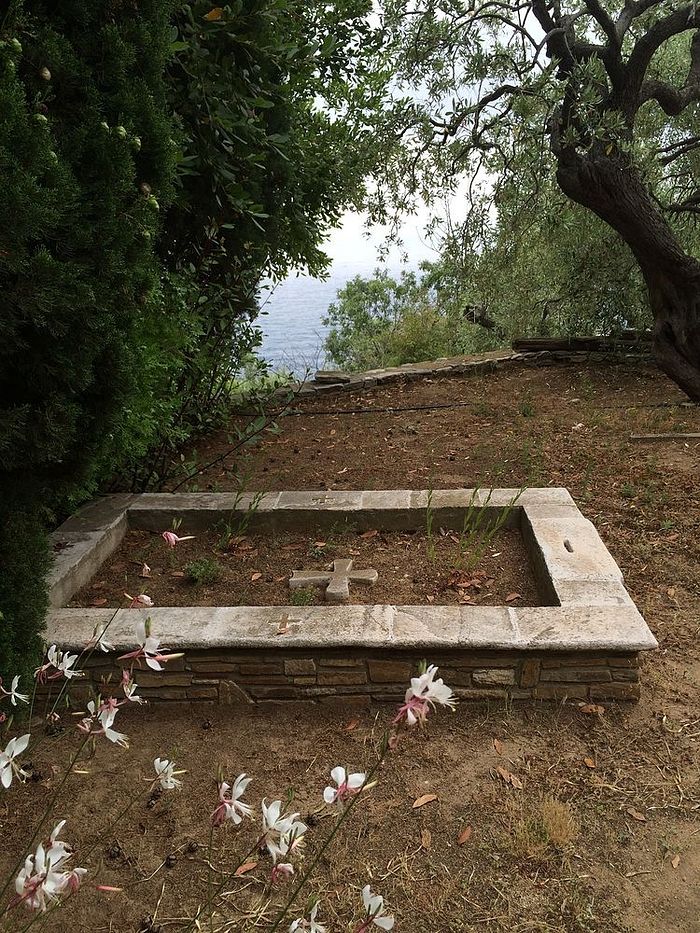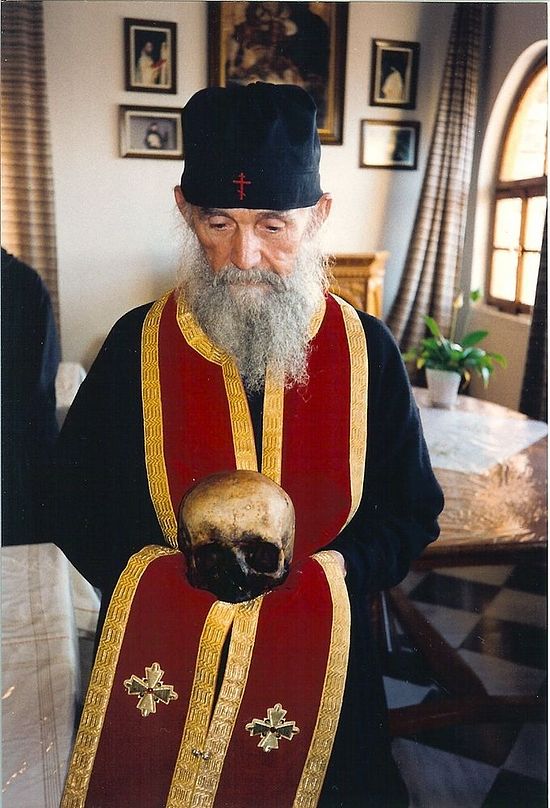Ἀγαπητά μου παιδιά, Ὁ Κύριος ἡμῶν Ἰησοῦς Χριστός στήν παραβολή τῶν ταλάντων ἐκθέτει, παρουσιάζει παραστατικά κι ἀνάγλυφα τίς συνέπειες τῆς μή συγχωρήσεως ὅλων ἐκείνων τῶν σφαλμάτων πού οἱ ἄλλοι ἄνθρωποι μᾶς ἔκαναν· δηλαδή τί συμβαίνει, ὅταν δέν συγχωροῦμε μέ ὅλη μας τήν καρδιά ἐκείνους πού μᾶς ἔκαναν ὁποιοδήποτε κακό. Ἡ παραβολή τοῦ Εὐαγγελίου λέει, ὅτι ἕνας βασιλιᾶς θέλησε νά λογαριαστῆ μέ τούς δούλους του, ἐμᾶς τούς ἀνθρώπους. Μεταξύ τῶν ἄλλων παρουσιάστηκε κι ἕνας δοῦλος πού χρεωστοῦσε στόν κύριό του, τόν βασιλέα, μύρια τάλαντα – ἕνα ἀμύθητο ποσό. Ὁ δοῦλος φυσικά δέν εἶχε νά ἐξοφλήση αὐτό τό τεράστιο ποσό. Τότε ὁ κύριος του, τό ἀφεντικό του, διέταξε νά πουληθῆ ὅ,τι εἶχε καί δέν εἶχε, ἀκόμα καί ἡ γυναίκα του καί τά παιδιά του, γιά νά ἐξοφληθῆ τό χρέος. Ὁ δοῦλος βλέποντας ὅτι καταστρέφεται πλέον διά παντός, χωρίς καμμιά ἐλπίδα ἐξοφλήσεως τοῦ χρέους, ἔπεσε στά πόδια τοῦ κυρίου του. Τόν παρακαλοῦσε νά μακροθυμήση, νά τόν συγχωρήση, καί ὑποσχόταν ὅτι θά προσπαθήση νά ἀποδώση τό ὀφειλόμενο ποσό. Ἔτσι κάνουμε ὅλοι, ὅταν χρεωστοῦμε καί δέν ἔχουμε νά τά δώσουμε. Ὁ κύριος τοῦ δούλου ἐκείνου, ὅταν εἶδε τήν συντριβή του, ὅταν ἄκουσε τά παρακάλια του καί τίς μεγαλόστομες ὑποσχέσεις του, τόν εὐσπλαχνίσθηκε, τόν λυπήθηκε καί τοῦ χάρισε τό χρέος. Ὅλο τό τεράστιο χρέος τό ἔσβησε! Ἦταν στήν ἐξουσία του, ἦταν πλούσιος καί μποροῦσε νά τό κάνη. Ὅταν ὁ δοῦλος ἐκεῖνος ἔφυγε ἀπό τά ἀνάκτορα τοῦ βασιλέως, κατά σύμπτωσι συνάντησε ἕνα σύνδουλό του, ἕνα συνάδελφό του, ὁ ὁποῖος τοῦ χρεωστοῦσε μόνον ἑκατό δηνάρια, δηλαδή ἕνα τιποτένιο, μηδαμινό ποσό, περίπου ἑκατό σημερινές δραχμές. Τόν κράτησε καί τόν ἔπνιγε, λέγοντάς του νά ἀποδώση χωρίς ἀναβολή αὐτά πού τοῦ χρωστοῦσε. Ὁ σύνδουλος ἔπεσε στά πόδια του κι ἄρχισε νά τόν παρακαλῆ –ἀκριβῶςμέ τίς ἴδιες λέξεις πού παρακαλοῦσε αὐτός τόν βασιλέα προηγουμένος– νά μακροθυμήση γιά λίγο μέχρι νά τοῦ δώση τό ὀφειλόμενο μικρό ποσό. Ἐκεῖνος ὅμως, ὄχι μόνον δέν μακροθύμησε, ὄχι μόνον δέν τοῦ ἔδωσε προθεσμία, ὄχι μόνον δέν τόν εὐσπλαχνίσθηκε γιά ἕνα τόσο μικρό ποσό –κι ἐνῷ ἦταν ἕνας ἁπλός φτωχός ἄνθρωπος αὐτός ὁ σύνδουλος του– ἀλλά ἀπό ἀσπλαχνία τόν ἔβαλε στήν φυλακή, ἕως ὅτου δώση τίς ἑκατό δραχμές. Ὅταν οἱ ἄλλοι σύνδουλοι εἶδαν αὐτά πού ὁ δοῦλος ἐκεῖνος ἔκανε στόν σύνδουλό τους καί ὅταν μάλιστα ἔμαθαν ὅτι ὁ κύριος τους μόλις πρό ὀλίγου τοῦ εἶχε χαρίσει τό τεράστιο ποσό πού τοῦ χρεωστοῦσε, λυπήθηκαν πολύ. Ἕνα τόσο σοβαρό γεγονός δέν μποροῦσαν νά τό παραβλέψουν, νά τό ἀφήσουν νά περάση ἔτσι. Παρουσιάστηκαν μπροστά στόν βασιλέα καί τοῦ διηγήθηκαν μέ ἀκρίβεια, ἀλλά καί μέ πόνο ψυχῆς, ὅλα τά συμβάντα, τά τόσο θλιβερά, αὐτῶν τῶν δύο συνδούλων τους. Τότε ὁ κύριος ἐκάλεσε τόν δοῦλο ἐκεῖνο, τόν ἀχάριστο, πού τοῦ εἶχε χαρίσει τό χρέος, καί τοῦ εἶπε: «Δοῦλε πονηρέ, δοῦλε ἀχάριστε καί σκληρέ, ἐγώ σοῦ χάρισα ὅλο τό τεράστιο ἐκεῖνο χρέος σου, μόνο καί μόνο γιατί μέ παρακάλεσες. Δέν ἔπρεπε κι ἐσύ νά εὐσπλαχνισθῆς, νά λυπηθῆς, νά ἐλεήσης, νά συγχωρήσης τόν σύνδουλό σου, τόν φίλο σου, τόν φτωχό αὐτόν ἄνθρωπο, ὅπως κι ἐγώ ὁ κύριός σου ἐλέησα καί συγχώρεσα ἐσένα; Ἀνακαλῶ τό χαριστήριο γράμμα. Παίρνω πίσω τήν ἐξόφλησι, μιά καί φάνηκες τόσο ἀχάριστος. Ἡ θέσι σου εἶναι τώρα στή φυλακή, ἐφ᾿ ὅσον δέν ἔχεις νά τό πληρώσης. Οἱ βασανιστές θά σέ βασανίζουν, ἑως ὅτου ἀποδώσης τό ὀφειλόμενο ποσό κι ἐξοφλήσης τό χρέος σου, δηλαδή αἰώνια». Συμπέρασμα τῆς Παραβολῆς: Ἔτσι, λέει ὁ Κύριος, καί ὁ Πατέρας μου ὁ Οὐράνιος θά μεταχειρισθῆ ἐσᾶς. Τά ἴδια θά πάθετε καί ὅλοι ἐσεῖς, πού δέν θελήσατε μέ τήν καρδιά σας, νά συγχωρήσετε τόν ἀδελφό σας, γιά ὅλα τά φταιξίματά του, γιά ὅλα ὅσα κακά σᾶς ἔκανε. Ἡ προειδοποίησις αὐτή τοῦ Κυρίου γιά τό φοβερό, τελικό κι ἀνεπανόρθωτο κατάντημα κάθε χριστιανοῦ πού δέν θέλησε νά συγχωρήση, δηλαδή ἡ αἰώνια καταδίκη του, θά πρέπει νά μᾶς βάλη ὄχι ἁπλῶς σέ ἔννοια, σέ σκέψι, σέ φόβο καί τρόμο, ἀλλά σέ ἀγῶνα. Ἀγῶνα ἐναντίον τῆς ἐκδικητικότητος. Τί θά ποῦμε; Τί θά ἀπολογηθοῦμε κατά τήν μεγάλη ἐκεῖνη ἡμέρα τῆς Κρίσεως, ὅταν βίβλοι ἀνοιγήσονται καί θά κριθοῦμε ἐκ τῶν γεγραμμένων ἔργων ἡμῶν ἐν τοῖς βιβλίοις; Ὅταν ὅλα αὐτά τά μικροπράγματα τοῦ κόσμου τούτου, γιά τά ὁποῖα ἐκδικούμεθα καί μαλώνουμε, θά ἔχουν παρέλθει ἀνεπιστρεπτί καί δέν θά μπορέσουμε νά τά διορθώσουμε; Ὅταν τά χρήματα, τά κτήματα, οἱ ἀξιοπρέπειες, οἱ προσβολές, οἱ ὑποτιμήσεις ἐντός εἰσαγωγικῶν καί τά παρόμοια θά ἔχουν περάσει; Ὅταν τά δικά μας πταίσματα θά εἶναι ὁλόκληρη βιβλιοθήκη, ἐνῷ τῶν ἄλλων πρός ἐμᾶς μιά μόνο μικρή σελίδα ἤ ἔστω λίγες σελίδες; Πῶς ὁ Θεός θά διαγράψη ὅλους αὐτούς τούς τόμους μέ τά δικά μας ἁμαρτήματα, ὅταν ἐμεῖς δέν θά ἔχουμε θελήσει μόνο μιά σελίδα νά διαγράψουμε μέ τῶν ἀδελφῶν μας τά πταίσματα; Τό ὁποιοδήποτε κακό πού μᾶς ἔκανε ὁ ἄλλος, ὁ γείτονας, ὁ ἀδελφός, ὁ συνεργάτης, ὁ συγγενής, δέν εἶναι τόσο μεγάλο, ὅσο μᾶς φαίνεται. Εἶναι παροδικό, δηλαδή καί σ᾿ ὅλη τήν ζωή νά διαρκέση, θά περάση κάποια μέρα. Δέν ἔχει αἰώνια ἰσχύ καί δύναμι καί ὕπαρξι. Τό κακό ὅμως πού κάνουμε ἐμεῖς οἱ ἴδιοι στόν ἑαυτό μας, ὅταν δέν συγχωροῦμε, εἶναι χωρίς τέλος. Ἔχει αἰώνια ἰσχύ καί θά τιμωρούμεθα αἰωνίως. Ἔχουμε λοιπόν νά διαλέξουμε μεταξύ δύο κακῶν. Ἐκείνου πού ὁ ἄλλος μᾶς κάνει καί πού εἶναι παροδικό, κι ἐκείνου πού κάνουμε ἐμεῖς στόν ἑαυτό μας, ὅταν δέν συγχωροῦμε, πού εἶναι αἰώνιο. Τώρα ποιός λογικός ἄνθρωπος θέλει τό κακό του καί μάλιστα τό αἰώνιο; Ξέρουμε ὅτι οἱ παρανοϊκοί εἶναι αὐτοί πού κάνουν κακό στόν ἑαυτό τους, αὐτοί πού ἔχουν πρόβλημα στό μυαλό τους. Οἱ ἀξιολύπητοι αὐτοί ἄνθρωποι, πού ἔχουν χάσει τίς φρένες τους, κόβουν μέ γυαλιά τά χέρια τους, πατοῦν σέ ἀναμμένα κάρβουμα, αὐτοτραυματίζονται, αὐτοκτονοῦν καί τόσα ἄλλα. Ὡστόσο κανείς λογικός δέν κάνει τέτοια πράγματα. Ἐάν λοιπόν τά μικρότερα αὐτά δέν τά κάνουμε, γιατί δέν τά βρίσκουμε λογικά, θά κάνουμε τά ἀπείρως μεγαλύτερα κακά στόν ἑαυτό μας; Θά τόν καταδικάσουμε οἱ ἴδιοι στό αἰώνιο σκοτάδι καί θά τόν στείλουμε νά κάνη συντροφιά μέ τούς δαίμονες, μόνο καί μόνο γιατί δέν θελήσαμε ἀπό ἐγωϊσμό νά διαγράψουμε τά μικροπράγματα πού μᾶς ἔκαναν οἱ ἄλλοι; Θά κάνουμε ἕνα τόσο μεγάλο λάθος; Ποῦ εἶναι ὅλες οἱ προηγούμενες γενεές, στίς ὁποῖες ἦσαν καί ἄνθρωποι πού ἔφυγαν ἀπό δῶ γιά πάντα, χωρίς νά συγχωρήσουν; Τί κέρδισαν οἱ ἄνθρωποι αὐτοί μέ τήν ἀσυγχωρησία πρός τούς ἄλλους; Δέν θά ἔχουν τώρα πιά μετανοιώσει πικρά, χωρίς ὠφέλεια καί χωρίς διόρθωσι; Βεβαίως. Ἐάν κάποιος δέν τά πιστεύη αὐτά, εἶναι φυσικά ἐλεύθερος νά κάνη ὅ,τι νομίζει. Ἕνας ὅμως πού λέει ὅτι εἶναι Χριστιανός Ὀρθόδοξος καί πιστεύει στόν Θεό καί στό Εὐαγγέλιο, δέν πρέπει νά τοῦ λείπη τό κόκκινο μολύβι. Τί σημαίνει αὐτό; Στά ἐπίσημα βιβλία τῶν ὑπηρεσιῶν οἱ διαγραφές γίνονται μέ κόκκινο μολύβι. Μέ αὐτό τό μολύβι ὁ καθένας, πού θέλει νά λέγεται Χριστιανός Ὀρθόδοξος, θά διαγράψη ἀπό σήμερα κάθε φταίξιμο τοῦ ἀδελφοῦ του. Ἀδελφός του εἶναι κάθε ἄνθρωπος, γνωστός καί ἄγνωστος, ὀρθόδοξος καί μή. Τό μολύβι αὐτό θά τοῦ χρησιμεύση, ὅταν πλέον φύγη ἀπό τόν κόσμο αὐτόν, σάν κλειδί, πού θά ἀνοίξη τήν πόρτα τοῦ Παραδείσου. Δηλαδή, ἐάν δέν τά διαγράψη μ᾿ αὐτό τό μολύβι τό κόκκινο, δέν μπορεῖ νά ἀνοίξη τόν Παράδεισο. Θά βάλει τό μολύβι τό κόκκινο ἐπάνω στήν κλειδαριά τῆς πόρτας τοῦ Παραδείδου καί θά ἀνοίξη. Μέ τό νά πῆ: «Θεός συγχωρήσοι σε» καί κάνοντας προσευχή γιά τόν ἀδελφό, ὁ Παράδεισος ἄνοιξε! Οἱ πέντε μωρές παρθένες χτύπαγαν ἄδικα τήν πόρτα τοῦ Παραδείσου τήν νύχτα ἐκείνη. Ἔμειναν ὅμως ἔξω στό σκοτάδι. Γιατί; Διότι δέν εἶχαν δείξει ἔλεος συμπάθεια, συγχωρητικότητα. Δέν εἶχαν οὔτε λάδι πού μαλακώνει τίς πληγές, οὔτε κόκκινο μολύβι πού σβήνει τά πταίσματα τῶν ἄλλων κι ἀνοίγει τόν νυμφῶνα, ἀνοίγει τόν Παράδεισο, ἀνοίγει τήν πύλη τῆς Ἄνω Ἱερουσαλήμ. Ναί, ἔμειναν ἔξω δυστυχῶς· καί ἔξω ἦταν σκοτάδι, πολύ σκοτάδι, κόλασις. Ἦταν νύχτα ἀσέληνη χωρίς φεγγάρι, παγερή νύχτα χωρίς θερμότητα.
Οἱ φρόνιμες ὅμως, αὐτές πού εἶχαν σώφρονα νοῦ καί σκέψι καί κυβέρνησι, μπήκανε στόν νυμφῶνα, μπήκανε στόν Παράδεισο καί στήν αἰώνια ζωή τοῦ φωτός. Εἴχανε λάδι, εἴχανε τήν καλοσύνη, τήν ἀγάπη, πού δέν ἐκδικεῖται, ἀλλά συγχωρεῖ ὅλους καί ὅλα.
Ἀπό ἐμᾶς ἐξαρτᾶται νά καθορίσουμε ἀπό τώρα τήν θέσι μας. Ἀπό ἐμᾶς ἐξαρτᾶται, ἐάν θά μποῦμε στόν νυμφῶνα μέ τίς φρόνιμες παρθένες ἤ θά μείνουμε ἔξω στό σκοτάδι τῆς παγερῆς νύχτας μέ τίς μωρές. Ἐφ᾿ ὅσον ἀκόμη εὑρισκόμεθα στήν ζωή αὐτή, ἐφ᾿ ὅσον ἡ αὐλαία τοῦ θεάτρου τοῦ παρόντος κόσμου δέν ἔπεσε καί τό νῆμα τῆς ζωῆς μας δέν κόπηκε, μποροῦμε νά συγχωρέσουμε. Μποροῦμε νά πάρουμε τήν ἡρωϊκή ἀπόφασι τοῦ « ἀφίεμεν τοῖς ὀφειλέταις ἡμῶν».
Κατά τήν Κυριακή προσευχή (τό «Πάτερ ἡμῶν»), πού μᾶς δίδαξε ὁ Κύριος, μέ τήν ὁποία προσευχόμεθα κάθε μέρα, σέ κάθε ἀκολουθία καί κάθε Κυριακή, λέμε στόν Θεό· «Συγχώρησέ με, Θεέ μου, ὅπως κι ἐγώ συγχωρῶ». Ὅταν ὅμως δέν συγχωροῦμε, Τοῦ λέμε ψέμματα. Ψευδόμεθα κάθε φορά, πού προσευχόμεθα μέ τό «Πάτερ ἡμῶν», διότι, ἐφ᾿ ὅσον δέν συγχωροῦμε τούς ἄλλους, ἀπαιτοῦμε συγχώρησι ἀπό τόν Θεό. Νά συγχωροῦμε, ὁπότε κι ὁ Θεός θά μᾶς συγχωρέση. Στήν προσευχή μας νά ζητοῦμε πρῶτα νά συγχωρέση ὁ Θεός ὅλους ἐκείνους πού μᾶς ἔκαναν κακό, νά συγχωρέση ὅλων τῶν ἀνθρώπων τίς ἁμαρτίες, καί μετά νά παρακαλοῦμε νά συγχωρέση κι ἐμᾶς, πού Τοῦ φταίξαμε δυστυχῶς πολύ περισσότερο.
Κάποτε, γράφει τό Γεροντικό, ἕνας ἀδελφός, ἕνας νεώτερος μοναχός πῆγε σ᾿ ἕνα Γέροντα πνευματικό καί τοῦ εἶπε:
Κάποιος ἄνθρωπος κλέπτης γυρνᾶ καί κλέβει τίς καλύβες τῶν Πατέρων. Ἔκλεψε καί τά δικά μου, τό παξιμάδι καί τά ἐλάχιστα τρόφιμα πού εἶχα. Σκέφτομαι, πῆρα τήν ἀπόφασι νά τόν καταγγείλω στό δικαστήριο γιά νά συμμορφωθῆ, νά σταματήση τήν ἁμαρτία, νά πληρώση κι ἔτσι νά τοῦ γίνη καλό μάθημα.
Ὁ Γέροντας ὅμως ὁ πνευματικός τόν συμβούλευε καί τοῦ ἔλεγε:
Ὄχι, παιδί μου, μήν τό κάνης αὐτό, μήν τόν πᾶς στόν δικαστή, μήν τόν καταγγείλης – ἄνθρωπος εἶναι, συγχώρεσέ τον· κάνε προσευχή νά τόν φωτίση ὁ Θεός νά ἀφήση τήν κλεψιά.
Ὄχι, Γέροντα, αὐτός δέν συμμορφώνται, ἔχει πάρα πολύ καιρό πού τό κάνει αὐτό. Ἄν δέ τιμωρηθῆ, θά συνεχίση, ὁπότε τοῦ κάνουμε κακό.
Ὄχι, παιδί μου, δέν πρέπει νά τόν καταγγείλης· ὄχι στόν δικαστή. Στόν Θεό ἄφησε τήν ὑπόθεσι.
Ὁ νεώτερος στηριζόμενος στήν ἄποψί του δέν ὑποχωροῦσε. Τότε ὁ Γέροντας τοῦ λέει:
Ἐφ᾿ ὅσον τὄχεις ἀποφασίσει, πᾶμε νά κάνουμε προσευχή, νά πάη καλά ἡ δουλειά σου.
Ὅταν γονάτισαν γιά προσευχή ἄρχισε ὁ Πνευματικός νά λέη τό «Πάτερ ἡμῶν». Ὅταν ἔφτασε στό σημεῖο: «καί ἄφες ἡμῖν τά ὀφειλήματα ἡμῶν», εἶπε ὁ Γέροντας:
Κύριε μήν μᾶς ἀφήνης τά ἁμαρτήματά μας, διότι κι ἐμεῖς δέν ἀφήνουμε τά ἁμαρτήματα τῶν ἀδελφῶν μας, πού μᾶς ὀφείλουν.
Πάτερ, κάνετε λάθος, δέν εἶναι ἔτσι τό «Πάτερ ἡμῶν».
Ἐφ᾿ ὅσον θά πᾶς στόν δικαστή νά καταγγείλης τόν ἀδελφό πού ἁμάρτησε, αὐτό τό «Πάτερ ἡμῶν», θά ποῦμε.
Ὁ ἀδελφός κατάλαβε, ὅτι εἶχε λάθος στήν ἄποψί του, ζήτησε συγγνώμη κι ἔτσι ὑποχώρησε καί δέν κατήγγειλε τόν πταίσαντα ἀδελφό του.
Αὐτή ἡ διήγησις εἶναι τόσο πολύ διδακτική, εἶναι τόσο πολύ ὠφέλιμη, πού ἄν συνειδητοποιήσουμε τήν ἔννοια καί τήν οὐσία της, εἶναι πάρα πολύ εὔκολο νά ἀγωνισθοῦμε, γιά νά ἔχουμε παρρησία στόν Θεό, παρρησία στήν προσευχή. Ὅταν θά συγχωροῦμε ἀφειδῶς, πλούσια κάθε ἄνθρωπο, ὁ ὁποῖος μᾶς ἔκανε κακό, θά ἔχουμε τό θάρρος, θά ἔχουμε τήν παρρησία, νά ζητήσουμε τήν αἰώνια συγγνώμη μας κι ἔτσι νά βρεθοῦμε μετά τῶν σωζομένων δούλων τοῦ Θεοῦ. Ἀμήν.
Τέλος καί τῷ Θεῷ δόξα!
Ἀπό τό βιβλίο: “ Ἡ τέχνη τῆς σωτηρίας”
Γέροντος Ἐφραίμ Φιλοθεΐτου
Ἔκδοσεις Ἱερᾶς Μονῆς Φιλοθέου Ἅγιον Ὄρος
Τόμος α΄
Κεντρική διάθεση:
ΕΚΔΟΣΕΙΣ: «ΟΡΘΟΔΟΞΟΣ ΚΥΨΕΛΗ»













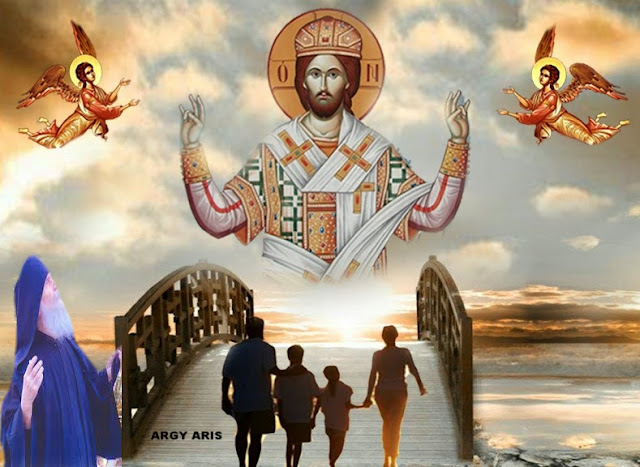












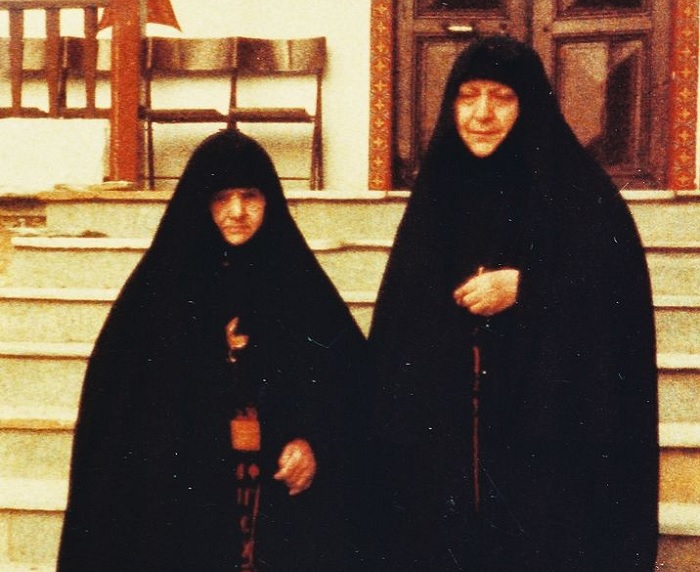 Gerontissas Theophano (left), and Macrina
Gerontissas Theophano (left), and Macrina 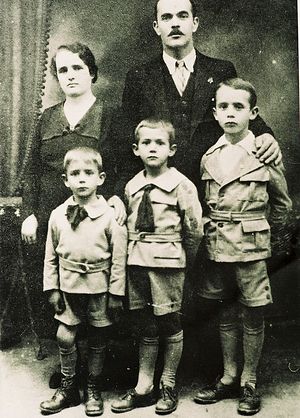
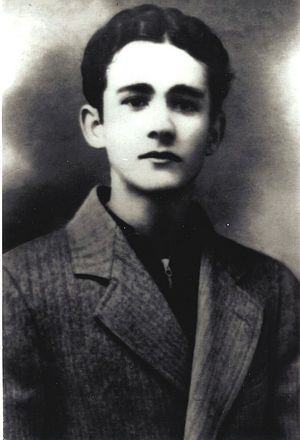 Elder Ephraim in youth
Elder Ephraim in youth 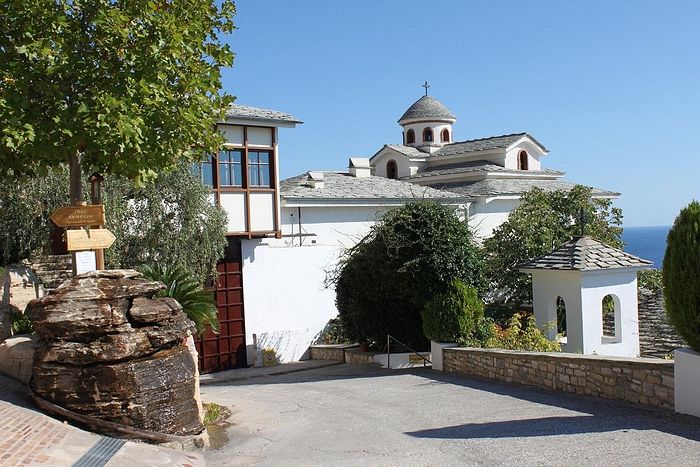 The Monastery of the Archangel Michael
The Monastery of the Archangel Michael 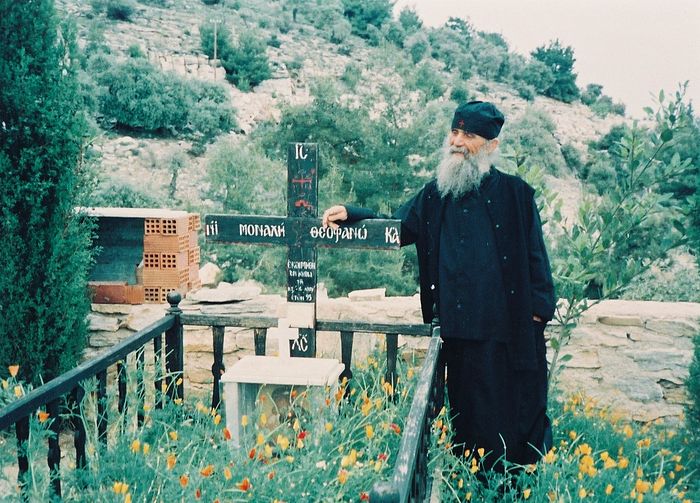 Elder Ephraim at the grave of his mother
Elder Ephraim at the grave of his mother 